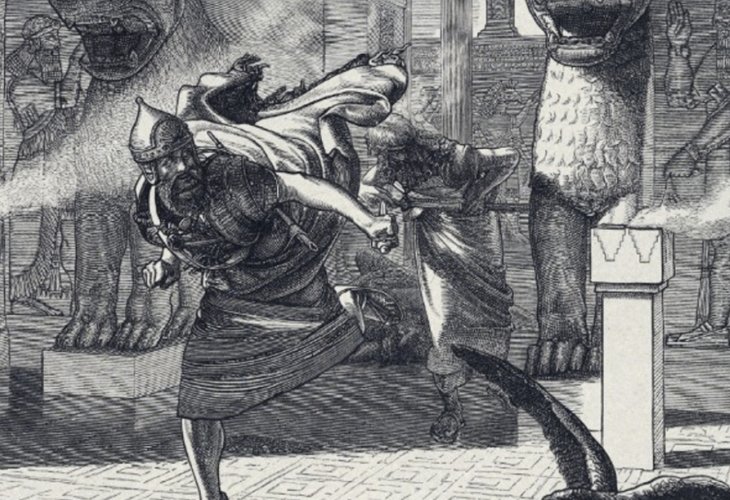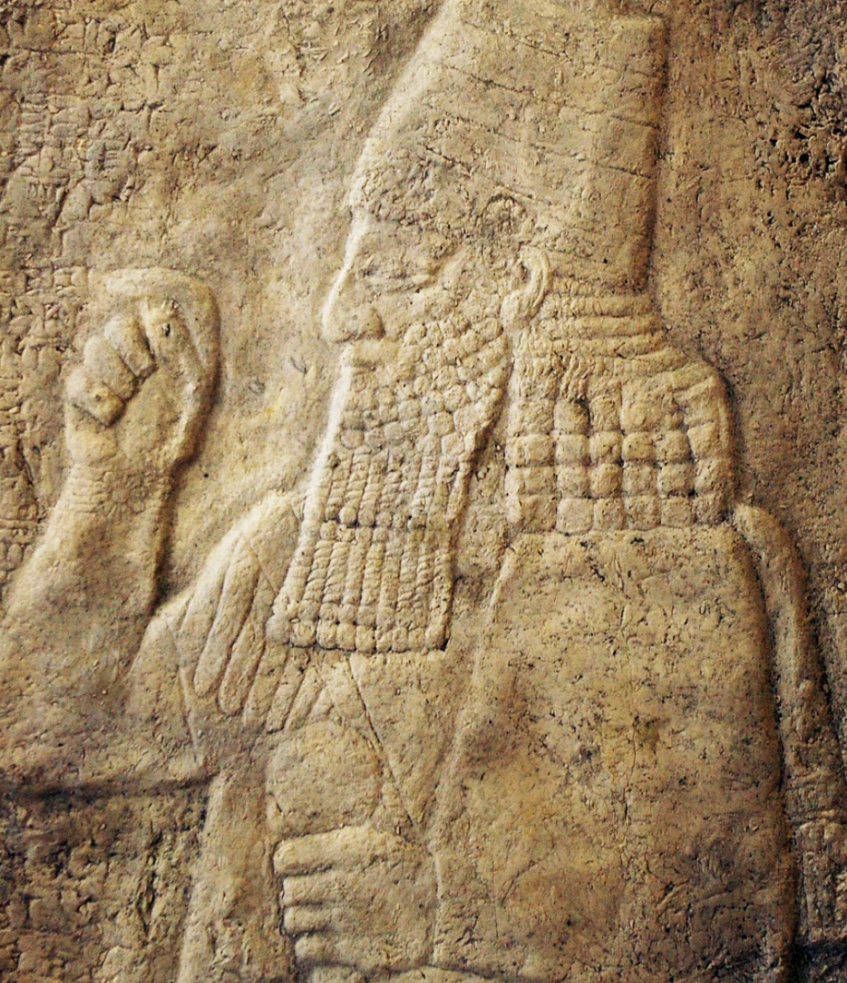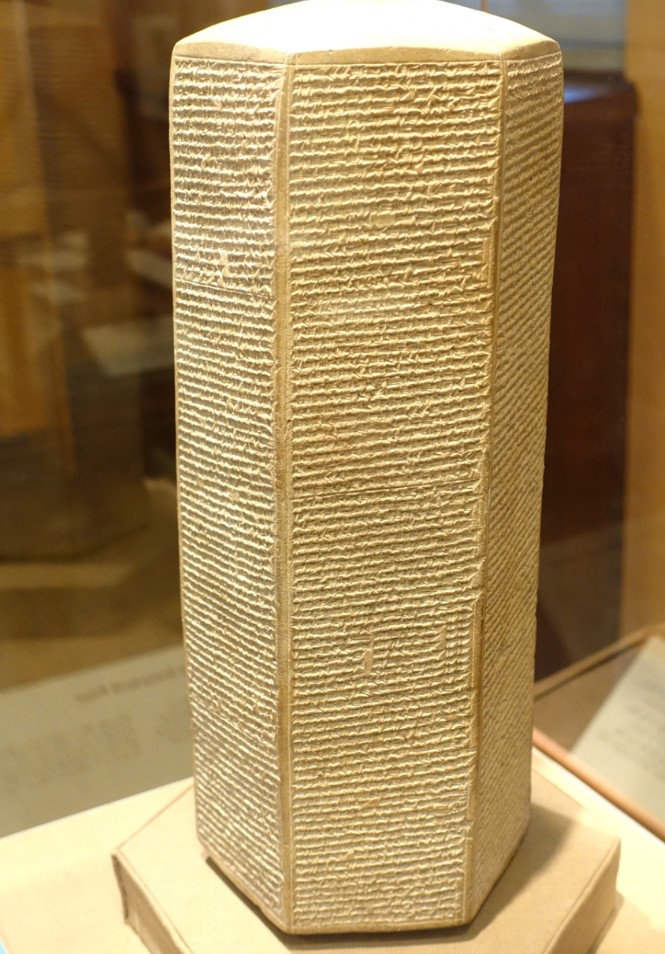Sennacherib's Unfinished Siege of Jerusalem
Discover what truly befell Sennacherib. An exclusive excerpt from Rabbi Zamir Cohen's latest book, "Biblical Archaeology III," now available.
 The Flight of Sennacherib's Sons After His Assassination
The Flight of Sennacherib's Sons After His AssassinationIn 1830, Sennacherib's palace was unearthed in the ancient city of Nineveh, located in modern-day northern Iraq. In the ruins, archaeologists discovered a clay prism inscribed with Akkadian script. This artifact commemorates Sennacherib's military expeditions, including his campaign against the land of Judah and his siege of Jerusalem. Beginning with a boastful introduction as "I, Sennacherib, the great king, the mighty king, king of the world," he proudly detailed his successful conquests, celebrating his army's triumphs.
Yet, among these boasts, when describing Jerusalem's fate, the prism offers a curious narrative. Instead of exulting over the conquest of the Jewish capital, Sennacherib avoids any mention of its capture, merely noting his siege of Hezekiah within his city—"As for Hezekiah the Jew... him I confined within Jerusalem, his royal city, like a bird in a cage. I laid siege to the city, making the exit from his gate detestable."
According to experts, this evasive account indicates the failure of the Assyrian king to conquer Jerusalem.
What Really Happened at Jerusalem's Walls?
The Biblical account provides a detailed narrative of the campaign's end, chronicling Hezekiah's fervent prayer to Hashem for salvation, Isaiah's prophecy confirming the prayer's acceptance, and the miraculous defeat of the Assyrian army: "Hezekiah prayed to Hashem, saying... Hashem, incline Your ear and hear; open Your eyes and see... Now, Hashem our God, save us from his hand."
And Isaiah, son of Amoz, sent to Hezekiah, saying: "Thus says Hashem, the God of Israel, because you have prayed to Me regarding Sennacherib, King of Assyria [to save you from his threat, I have accepted your prayer, and thus]... a remnant of the house of Judah shall again take root downward and bear fruit upward..."
 Sennacherib
SennacheribTherefore, thus says Hashem concerning the king of Assyria: He shall not come into this city, nor shoot an arrow there, nor come before it with shield, nor cast a siege mound against it. By the way he came, by the same shall he return; and he shall not come into this city, declares Hashem. For I will defend this city to save it, for My own sake and for David My servant's sake."
And the angel of Hashem went out and struck 185,000 in the Assyrian camp. And when the people arose early in the morning, they were all dead bodies. So Sennacherib, king of Assyria, departed and returned, and dwelt in Nineveh."
Researchers agree that the scant description on the prism aligns with the Biblical narrative of Sennacherib's unsuccessful attempt to capture Jerusalem. This significant omission corroborates the Biblical claim that Jerusalem was not conquered and that the Assyrian army suffered a miraculous setback at the hands of Hashem.
What Ultimately Happened to Sennacherib?
Assyrian inscriptions and other ancient texts do mention his assassination, but the details are vague about the why and by whom. The Bible sheds light on this mystery: "Sennacherib departed and returned to Nineveh. And it came to pass, when he was worshiping in the house of Nisroch his god [derived from the wood of Noah's Ark, which the Assyrians deified], that Adrammelech and Sharezer, his sons, struck him down with the sword, and they escaped to the land of Ararat. And Esarhaddon's son reigned in his place."
The Biblical account reveals that Sennacherib returned to Nineveh humiliated and was murdered by his sons. The Talmud elaborates that his sons killed him because he had vowed to sacrifice them if victorious in battle. Here is the Talmud's account, translated from Aramaic: "[Sennacherib] found a plank from Noah's Ark. He said: This is the great god that saved Noah from the flood. He declared that if he succeeded in battle, he would sacrifice his two sons. They overheard and killed him. As written: "And as he worshipped in the house of Nisroch his god, Adrammelech and Sharezer his sons struck him down with the sword."
The precise act of Sennacherib's stabbing in his own country was foretold earlier by the prophecy of Isaiah: "And when the servants of King Hezekiah came to Isaiah, Isaiah said to them: Thus you shall say to your master: Thus says Hashem, do not be afraid of the words you have heard, that the young men of the king of Assyria have blasphemed Me. Behold, I will send a spirit upon him; he will hear a rumor and will return to his country; and I will cause him to fall by the sword in his own land."
Sennacherib and Noah's Ark
As mentioned, the Bible and Talmud state that Sennacherib attributed Noah's survival during the flood to the Ark itself, worshiping a plank of wood from the Ark as a deity.
However, how did he come to possess this piece from the elusive Ark resting on the mountains of Ararat in eastern Turkey?
For many years, travelers through eastern Turkey reported Assyrian engravings found on the high rocks of these mountains. Once deciphered, the Akkadian inscriptions revealed they were made at Sennacherib's behest to commemorate his victories over regional rebels, with his likeness featured on at least one.
 Sennacherib's Prism
Sennacherib's PrismIndeed, it is known that King Sennacherib of Assyria took expeditions to the area now known as eastern Turkey to suppress uprisings, consolidate his power, and source high-quality stones unique to the region for his palatial constructions. It is no stretch to surmise that Sennacherib, aware of the tradition surrounding Noah's Ark, discovered a plank from it, leaving behind carvings as monuments to his presence.
The ancient ties between the Assyrian Empire and eastern Turkey gain further credence from the Biblical account of Sennacherib's sons fleeing to the "land of Ararat" after his assassination—a location likely close to the mountains of Ararat. The absence of any temples or idols named Nisroch in Assyria or Babylon suggests that this god was a singular relic, its uniqueness stemming from its origin as a genuine piece of Noah's Ark, unlike other replicable idols.
To purchase the book "Biblical Archaeology III" via the Hidabroot Shop,click here.
To purchase the entire "Biblical Archaeology" trilogy set via the Hidabroot Shop, click here.

